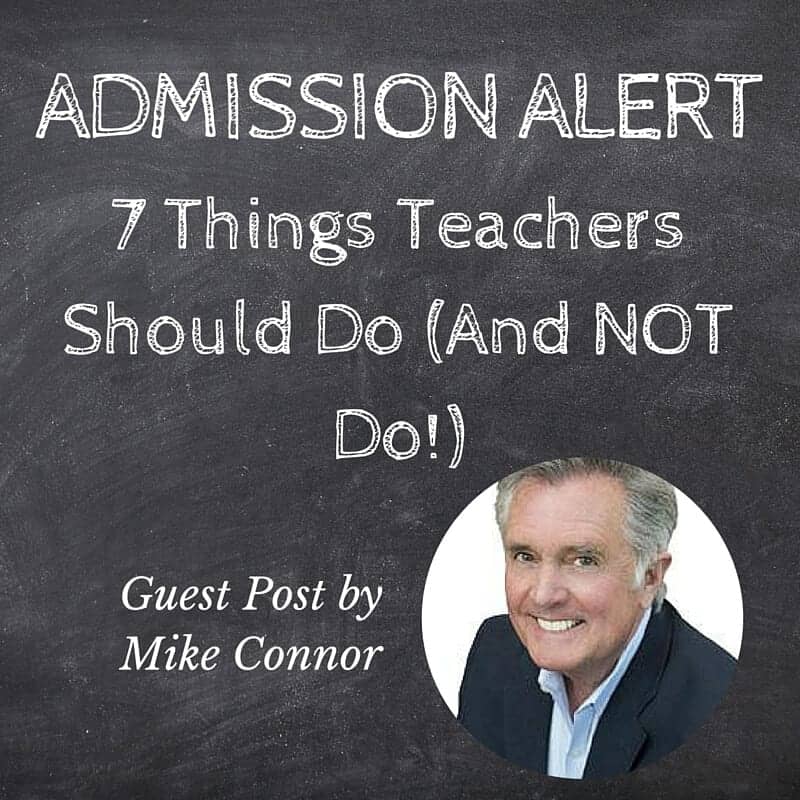
As we prepare for opening day and orientation meetings this fall, here are a few concrete suggestions (some tongue in cheek) that you can share to remind teachers and coaches of the huge role they play as advocates for your school. In a parent's mind, teachers hold the credibility cards. Discuss with your faculty how they can do their part to attract and retain the students and families they want to teach.
1. Bank up the positive news about the student.
Get goodwill in the bank. Send random notes of gratitude to parents, early and often. For no reason at all. These random acts let parents know that you know their child and value and care about her as much as they do. You will surely have to draw on this goodwill account if the wheels fall off the bus in February.
2. Be clear about your best intentions.
What do you want each child to learn from having known you?
What life lesson are you hoping your students will gain after a year in your Algebra 2 class, for example? How will you help train parents to meet their child’s emotional, social, and academic support needs?
3. When problems arise, as they certainly will, describe them as observable behaviors.
Do not frame them as “bad decisions” on the student’s part or choose other statements that parents will assuredly take as a severe and unfair judgment of their child or their parenting. Do not wait, hoping the behavior will change. No surprises to parents allowed! Not at these prices!
For example, here’s how NOT to frame a problem to a parent of a Middle Schooler: (The teacher here is essentially telling a parent that their son is an intellectual sloth).
Randy didn’t just drop the ball on this essay. He kicked it into the woods and left it there.
Witty to me, but I am sure the mother may have thought otherwise. What do you think she thought? “Oh, this teacher is such an engaging conversationalist! I am so glad he’s there inspiring my son while I pay with my astronomical annual tuition check!”
4. Don’t be their buddy.
Taking parents into your confidence, while it may make you feel more connected to them, can actually put them in an awkward position, and can ultimately undermine their respect for you. They really don’t want to know about your personal preferences or politics, or what you really think of the Head of School.
Your students themselves often make this difficult because they always want to know “personal stuff” about their teacher. But like the NSA, everything you say and do goes home with them. And if it’s taken as a negative by the parent, look out!
Winston Churchill once said, “A lie can spread halfway around the world before the truth has time to get its pants on.” Sadly, negative word of mouth travels faster than good news.
5. Show respect and enthusiasm for your colleagues.
Be collegial! Parents love to see teams of teachers working together as professionals. “Look at all of these adults bringing their attention and wisdom to bear on my child’s life! They're working together; coaching each other about how to bring out the best in my child. They're setting a great example of what success, cooperation, and respect look like!”
When teachers in one division speak highly of those in another division — when they “sell up,” and when the Upper Division teachers reach down and “scoop up” students – that tells parents and students they are wanted and everyone’s paying attention. Decisions to enroll and re-enroll are almost always emotional ones.
The more cross-age, cross-divisional, cross-departmental, and cross-athletic contact you have—and the more you communicate it—the more parents will know they are getting a great return on their considerable investment.
6. It’s not just what you say.
Parents are experts at reading nonverbal behavior.
When talking about a teacher in another division, don’t roll your eyes. Parents might tend to interpret this as disdain.
Better yet, never say or imply anything negative about another teacher. It makes you look bad.
It doesn’t even have to be as overt as an eyeroll. What you don’t say can speak volumes when a parent asks for your opinion about the school, an administrator, or another teacher. What you don't say is often interpreted by a parent as the “silent veto.”
7. Parents choose schools based on evidence of great teachers and great teaching.
Period. Full stop. At the prices independent schools have to charge, they expect transformational teaching and learning.
When it comes to enrollment and re-enrollment, remember that teachers hold all the credibility cards. As one of my admission director friends is fond of saying,
“The admission office may set the table, but the teachers bring the entrée.”

